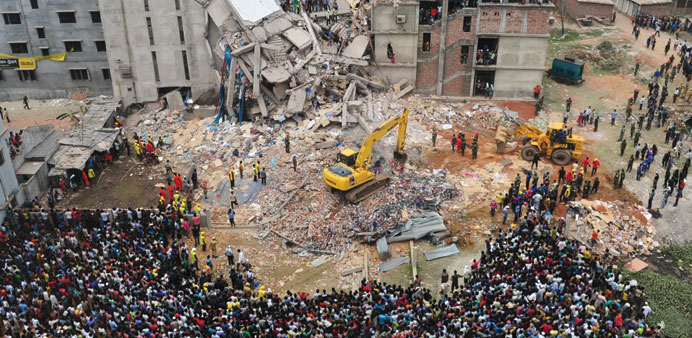In this photograph taken on April 25, 2013, volunteers and rescue workers are pictured at the scene after an eight-storey building collapsed in Savar, on the outskirts of Dhaka.
AFP/Dhaka
A Bangladesh court yesterday ordered the arrest of 24 people and seizure of their assets after they failed to turn up to face murder charges over the collapse of a garment factory that killed more than 1,100 people.
Senior judicial magistrate Mohammad Al Amin issued the warrants after his court accepted the murder charges against the 24 fugitives for the collapse in April 2013 of the Rana Plaza factory compound, one of the world’s worst industrial
disasters.
“The court accepted the charge sheet against 41 people who have been charged with murder over the Rana Plaza disaster,” prosecutor Anwarul Kabir said.
“The court issued arrest warrants against 24 of them as they have absconded. It also ordered the seizure of their property,” he said, adding police have been asked to report on their arrests by January 27.
Kabir said the court had accepted the charges against four government factory and building inspectors despite attempts by their departments to shield them from prosecution by citing public servant immunity rules.
The case was delayed by “several months” due to the non-clearance by the various departments, Kabir said, adding that prosecutors now expect the trial to start by April next year.
Among the 41 who have been charged with murder is Sohel Rana, the owner of the nine-storey complex on the outskirts of Dhaka which collapsed on April 24, 2013, at the start of the working day.
Rana, who is in custody awaiting trial, became Bangladesh’s public enemy number one after survivors recounted how they were forced to start work despite complaints about cracks developing in the walls the previous day.
At least 1,138 people are known to have died in the tragedy, the worst in the country’s history. Rescue workers struggled for weeks to retrieve the bodies from the ruins but several people are still unaccounted for.
More than 2,000 people were injured, including many who lost limbs.
Seven owners of factories housed in the complex and 12 government officials responsible for safety and inspections were also charged with murder.
Rana’s parents, who jointly owned the building with him, and the mayor and councillor of the town of Savar where it was located, were also charged.
Those facing arrest including “associates of Rana” who “slapped and forced” the workers to join the shift, Kabir said.
In a separate case Rana and 41 others have been charged with violating building codes and with illegally extending the six-storey building, which was initially approved as a shopping mall, into a nine-storey factory complex.
The disaster highlighted appalling safety problems in Bangladesh’s $30 billion garment industry and triggered global concern as protesters marched to demand action from Western retailers.
A host of such retailers had clothing made at the five factories housed at Rana Plaza, including Italy’s Benetton, Spain’s Mango and the British low-cost chain Primark.
The disaster prompted sweeping reforms including new safety inspections and higher wages in the industry which employs about four million workers.
Two groups of top retailers such as Walmart and H&M have since launched drives to clean up the sourcing factories. They hired engineers to review fire, building and electrical safety in thousands of garment plants.
Under the clean-up campaign, engineers have identified safety problems in each of the plants, and drawn up recommendations for upgrades as well as setting deadlines for the owners to implement remedial measures.

